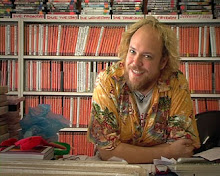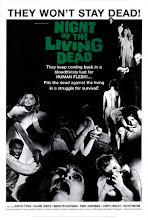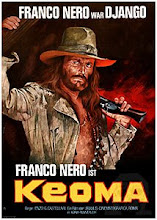 Santo vs Dr Death
Santo vs Dr DeathSpain/Mexico 1973 colour
aka Santo Contra El Dr Muerte; onscreen title "Masked Man Strikes Again (Santo vs. the Dr. Death)"
Director Rafael Romero Marchant Writers Rafael Romero Marchant, José Luis Navarro Basso
Cast Santo (himself), Carlos Romero Marchant (Paul), Helga Liné (Sara), Jorge Rigaud (Dr. Robert Mann)
 We continue our season of Santo films with the fourth and final Santo film dubbed into English. I sometimes forget just how far these Mexican wrestling films travelled - even as far as Turkey, where they stole the Man in The Silver Mask's image and teamed him up with Captain America against an evil Spiderman.
We continue our season of Santo films with the fourth and final Santo film dubbed into English. I sometimes forget just how far these Mexican wrestling films travelled - even as far as Turkey, where they stole the Man in The Silver Mask's image and teamed him up with Captain America against an evil Spiderman.
Naturally the Spanish-language Santo films would be a huge hit in Spain, and not just because of the lingo; Spain, like the rest of Europe, was obsessed with comic book superheroes, and in numerous co-productions with Italy they made their own: Goldface, Argoman, Superargo, the list is seemingly endless. Enter Santo vs Dr Death, a Mexican masked wrestling film which was actually made in
 Our mask-wearing, villain-wrestling, crime-fighting superhero Santo heads to
Our mask-wearing, villain-wrestling, crime-fighting superhero Santo heads to
 Santo Contra el Dr Muerte is unfairly dismissed by many Santo fans as "too Seventies", but therein lies its charm: an intensely and perversely Seventies aesthetic, with a James Bond soundtrack gone surfadelic almost to the point of cheesadelic, and the absurd image of a masked wrestler (a man pushing sixty, no less) swinging from a helicopter in a classic speedboat chase. Schlock Treatment, as always, is proud to present another in our Fiesta del Santo: the 1973 Santo vs Dr Death.
Santo Contra el Dr Muerte is unfairly dismissed by many Santo fans as "too Seventies", but therein lies its charm: an intensely and perversely Seventies aesthetic, with a James Bond soundtrack gone surfadelic almost to the point of cheesadelic, and the absurd image of a masked wrestler (a man pushing sixty, no less) swinging from a helicopter in a classic speedboat chase. Schlock Treatment, as always, is proud to present another in our Fiesta del Santo: the 1973 Santo vs Dr Death.
aka La Maldicion de Nostradamus
Director "Frederick"/Federico Curiel Producer Victor Parra Writers Alfredo Ruanova, "Charles E. Taboada"/Carlos Enrique Taboda
Cast German Robles (Nostradamus), Domingo Soler (Professor Dolan), Julio Aleman (Antonio/Tony), Aurora Alvarado (Anna), Manuel "Manver/Mamber" Vergara (Leo),
 We've played some strange Mexican horror films over the last year - The Brainiac springs screaming and slurping to mind - but none as abstract as The Curse Of Nostradamus. What started its life as a twelve part serial for Mexican theatres in 1959 was edited into four features between 1961 and 1963; in the great South of the Border gold rush, it was bought by
We've played some strange Mexican horror films over the last year - The Brainiac springs screaming and slurping to mind - but none as abstract as The Curse Of Nostradamus. What started its life as a twelve part serial for Mexican theatres in 1959 was edited into four features between 1961 and 1963; in the great South of the Border gold rush, it was bought by
 And what a bizarre character representing the “dark” side: played by the tall, gaunt, aristocratic German Robles, a distinguished poet and stage actor forever typecast in similar roles after the phenomenal success of his title role in The Vampire and The Vampire's Coffin. With Nostradamus Junior his El Vampiro persona veers off on a wild tangent: a surrealist anti-hero with one foot in the world of shadows, taunting the pitiful mortals with his accursed knowledge in such erudite fashion.
And what a bizarre character representing the “dark” side: played by the tall, gaunt, aristocratic German Robles, a distinguished poet and stage actor forever typecast in similar roles after the phenomenal success of his title role in The Vampire and The Vampire's Coffin. With Nostradamus Junior his El Vampiro persona veers off on a wild tangent: a surrealist anti-hero with one foot in the world of shadows, taunting the pitiful mortals with his accursed knowledge in such erudite fashion.
 The Sixteenth Century occultist prophet Nostradamus is now the living dead, resting in a coffin in his Aztec-style castle and issuing orders to his vampire son to destroy the wave of rationalist science sweeping over the land and restore the good family name. The son (let’s call him Nostradamus for convenience) gatecrashes the engagement party Professor Dolan is holding for his daughter Anna and her fiancée Tony, who is also the Professor's assistant). Dolan foolishly dismisses rumours of vampires, having just finished a series of lectures on the need for a scientific and rationalist approach on all superstitions. In swoops Nostradamus, in top hat and cape, hypnotically wide-eyed and utterly humourless. He demands Dolan acknowledge the World of Shadows, and to underline the point, begins to works his way, serial killer style, through a shit list of the Professor’s thirteen dinner guests like a satanic Steve Buscemi. Naturally the Professor is forced to rethink his ideas on the supernatural while predicting Nostradamus' next move – which is difficult, considering Nostradamus can turn into a bat at will, and dispatches his hunchbacked assistant (who sounds suspiciously like John Hurt as the Elephant Man) as muscle.
The Sixteenth Century occultist prophet Nostradamus is now the living dead, resting in a coffin in his Aztec-style castle and issuing orders to his vampire son to destroy the wave of rationalist science sweeping over the land and restore the good family name. The son (let’s call him Nostradamus for convenience) gatecrashes the engagement party Professor Dolan is holding for his daughter Anna and her fiancée Tony, who is also the Professor's assistant). Dolan foolishly dismisses rumours of vampires, having just finished a series of lectures on the need for a scientific and rationalist approach on all superstitions. In swoops Nostradamus, in top hat and cape, hypnotically wide-eyed and utterly humourless. He demands Dolan acknowledge the World of Shadows, and to underline the point, begins to works his way, serial killer style, through a shit list of the Professor’s thirteen dinner guests like a satanic Steve Buscemi. Naturally the Professor is forced to rethink his ideas on the supernatural while predicting Nostradamus' next move – which is difficult, considering Nostradamus can turn into a bat at will, and dispatches his hunchbacked assistant (who sounds suspiciously like John Hurt as the Elephant Man) as muscle.
 It’s as insane as it sounds, wet with lurid horror imagery from Fifties comic books and 40s horror films filtered through a unique genre-obsessed culture of colonialism, Catholicism, Hispanic fervour, and European philosophy. It's a deliberate effort to reinvent both the already-haggard vampire mythos and German Robles himself into
It’s as insane as it sounds, wet with lurid horror imagery from Fifties comic books and 40s horror films filtered through a unique genre-obsessed culture of colonialism, Catholicism, Hispanic fervour, and European philosophy. It's a deliberate effort to reinvent both the already-haggard vampire mythos and German Robles himself into






















































































No comments:
Post a Comment